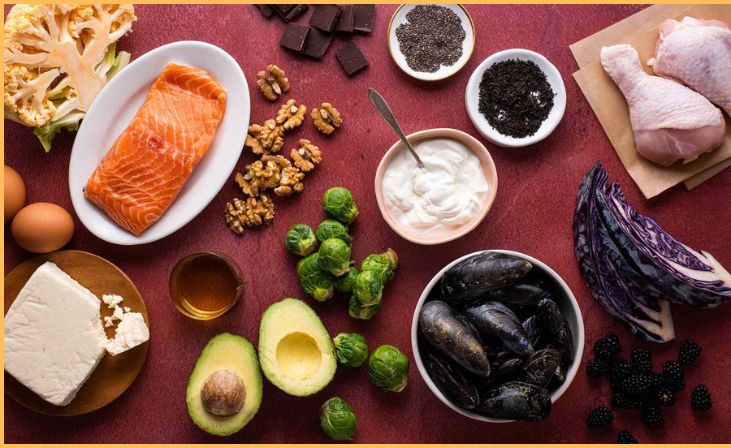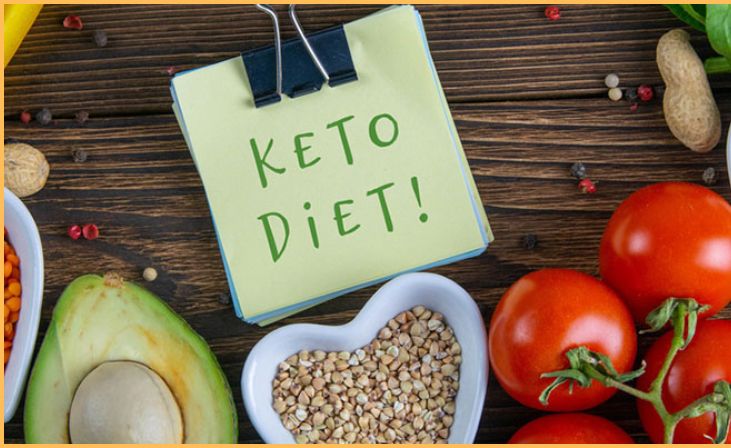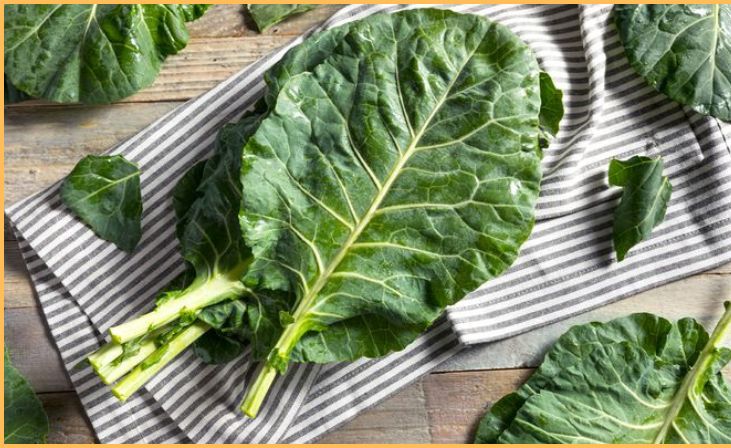Best Keto Diet Tips – The ketogenic (keto) diet, renowned for its emphasis on high fat, moderate protein, and low carbohydrate intake, has gained popularity as a transformative approach to weight management and overall well-being. This dietary strategy induces a metabolic state known as ketosis, where the body efficiently burns fat for energy.
Success in the keto journey hinges on adopting effective strategies. This guide presents the best tips to navigate the complexities of the keto diet successfully. From understanding macronutrients to managing lifestyle factors, these insights aim to empower individuals to achieve and sustain ketosis.
As we delve into the nuances of food choices, meal planning, and lifestyle adjustments, the goal is to provide a comprehensive roadmap for those seeking optimal results from their keto experience.
Best Keto Diet Tips
Understand the Basics

The keto diet involves high fat (70-75%), moderate protein (20-25%), and very low carbs (5-10%). Opt for healthy fats like avocados and olive oil. Control protein intake to avoid hindering ketosis. Stay hydrated and consider electrolyte supplementation.
Monitor daily carb intake carefully, including hidden carbs. Include fiber-rich veggies for nutrients. Plan meals to make keto-friendly choices and save time.
Test ketone levels for feedback on ketosis. Be mindful of snacking and prioritize nutrient-dense meals. Listen to your body’s response and consider professional advice before starting.
Also, Read – Healthy Mediterranean Diet Meal Plan Ideas
Choose the Right Fats

Selecting the right fats is crucial on the keto diet. Opt for healthy, unsaturated fats such as avocados, olive oil, and nuts.
These sources provide essential fatty acids and promote heart health. Incorporate coconut oil and butter for cooking, as they are rich in medium-chain triglycerides (MCTs), which can enhance ketone production.
Limit saturated fats from processed and fried foods, as excessive intake may impact cardiovascular health. Prioritize quality fats for overall well-being and to maintain the proper macronutrient balance essential for the success of the ketogenic diet.
Moderate Protein Intake

Maintaining a moderate protein intake is key in the keto diet. Choose high-quality protein sources like meat, fish, eggs, and dairy, aiming for 20-25% of your daily calories. Excessive protein can hinder ketosis, as the body might convert excess protein into glucose.
To prevent this, focus on adequate but not excessive protein consumption, which supports muscle maintenance without compromising the low-carb, high-fat principles of the keto diet.
Tailoring protein intake to your individual needs ensures a balanced approach, promoting overall health and the effective implementation of a ketogenic lifestyle.
Stay Hydrated
Staying hydrated is crucial on the keto diet. As your body shifts into ketosis, it excretes more water, increasing the risk of dehydration. Aim for at least 8 glasses of water daily, and more if physically active. Consider adding electrolytes to your routine, as reduced carb intake may impact their balance.
Electrolytes, including sodium, potassium, and magnesium, play a vital role in maintaining proper fluid balance and preventing symptoms like fatigue and muscle cramps.
Regular water intake supports overall health, aids digestion, and helps mitigate potential side effects during the adaptation phase of the ketogenic diet.
Also, Read – The Power of the Banana Peel
Monitor Carbohydrate Intake
Vigilantly monitoring carbohydrate intake is fundamental on the keto diet. Keep daily carb consumption low (5-10% of total calories) to maintain ketosis. Be aware of hidden carbs in sauces, condiments, and processed foods.
Prioritize non-starchy vegetables for fiber and essential nutrients while minimizing net carbs. Tracking carb intake through apps or food journals enhances awareness and promotes dietary success. Choose whole, unprocessed foods, and opt for low-carb alternatives to traditional high-carb options.
Consistent and mindful carbohydrate management is pivotal for achieving and sustaining the metabolic state of ketosis, the cornerstone of the ketogenic diet’s effectiveness for weight management and improved health.
Incorporate Fiber

Incorporating fiber is crucial on the keto diet for digestive health and nutrient balance. While carbs are limited, prioritize fiber-rich foods such as leafy greens, broccoli, and cauliflower to support regular bowel movements and overall well-being.
These low-carb, high-fiber options contribute essential vitamins and minerals. Additionally, consider incorporating sources like chia seeds and flaxseeds, which provide both fiber and healthy fats. Adequate fiber intake aids in satiety, promoting a feeling of fullness and helping control appetite.
Balancing low-carb, fiber-rich choices ensures a more sustainable and wholesome ketogenic diet that supports digestive function and overall nutritional requirements.
Plan Your Meals
Strategic meal planning is vital for keto diet success. Outline meals in advance, emphasizing high-fat, moderate-protein, and low-carb options. Incorporate diverse, nutrient-dense foods, considering portion sizes to meet your macronutrient goals.
Prepare keto-friendly snacks to curb cravings and prevent impulsive choices. Batch-cooking can save time and promote consistency. Check labels for hidden carbs in sauces and processed items.
A well-thought-out meal plan fosters adherence to the ketogenic lifestyle, reducing the likelihood of straying from dietary goals. Tailor plans to personal preferences and nutritional needs, ensuring a satisfying and sustainable approach to the keto diet.
Test Ketone Levels

Regularly testing ketone levels helps gauge the effectiveness of your keto diet. Utilize ketone test strips or a blood ketone meter for accurate measurements. Aim for a blood ketone level of 0.5-3.0 mmol/L for a state of nutritional ketosis.
Consistent monitoring provides valuable feedback on your body’s response to dietary choices and adherence to the ketogenic principles. Understand that individual ketone levels may vary, and factors such as hydration and exercise can influence results.
Adjust your diet accordingly, ensuring it aligns with your goals and helps maintain the desired state of ketosis for optimal weight management and overall well-being.
Be Mindful of Snacking
Mindful snacking is crucial on the keto diet to avoid unnecessary carb intake and maintain overall success. While keto-friendly snacks exist, be cautious not to overconsume, as excess calories can hinder weight loss. Prioritize nutrient-dense snacks like nuts, seeds, and cheese to satisfy hunger and provide essential fats.
Consider incorporating snacks into your daily carb count to stay within your overall limits. Recognize the difference between true hunger and boredom or habit-based cravings. By being mindful of snacking habits, you can better align your dietary choices with the goals of the keto diet and optimize your chances of sustained success.
Listen to Your Body

Listening to your body is pivotal on the keto diet. Pay attention to hunger and fullness cues, adapting your meals accordingly. Be mindful of energy levels, mood, and overall well-being. Adjust your fat, protein, and carb intake based on how your body responds.
Individual needs vary, so personalize your approach. If feeling fatigued, consider electrolyte balance and hydration. If weight loss stalls, reassess your calorie intake.
Learn to distinguish between true hunger and emotional triggers. By tuning into your body’s signals, you can tailor your keto journey for optimal results, ensuring a sustainable and health-conscious approach to this dietary lifestyle.
Conclusion
In conclusion, mastering the keto diet involves a mindful blend of nutritional choices, lifestyle adjustments, and consistent monitoring. As you embark on this transformative journey, remember that individual experiences may vary, and customization is key.
Embrace the process with patience and persistence. By following these tips, you lay the foundation for sustained ketosis and a healthier, more energized life.
Your commitment to the principles outlined here can turn the keto diet into a fulfilling lifestyle, promoting not only weight management but also overall well-being. Cheers to your continued success on the keto path!
FAQs
Use a macronutrient calculator or a nutrition app to determine your daily intake of fats, proteins, and carbohydrates based on your goals and body composition.
While protein is important, excessive intake may hinder ketosis. Consume moderate amounts and focus on quality sources.
Stay hydrated, replenish electrolytes, and gradually transition into the keto diet to minimize symptoms of the keto flu.

